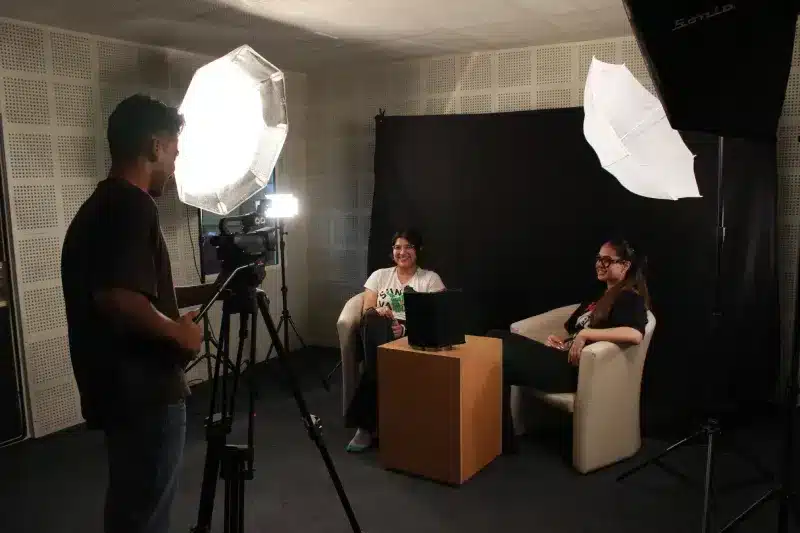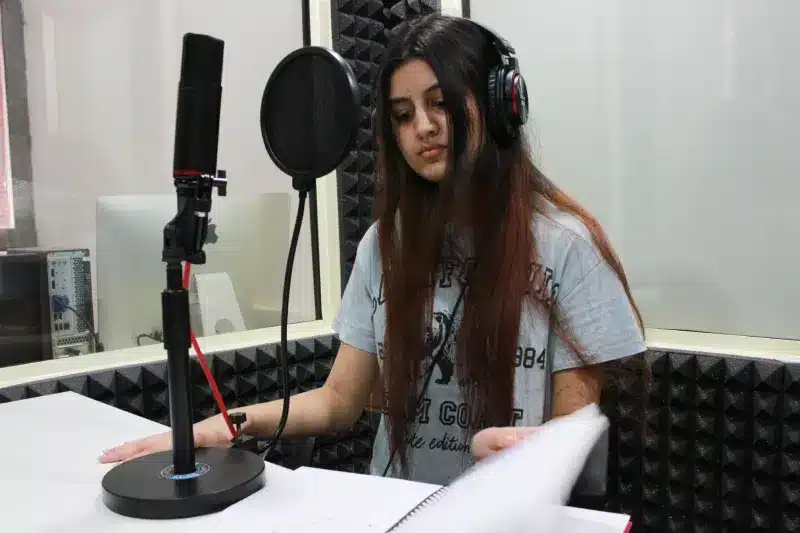Master of Arts (M.A) Marketing & Communication
2 Years Program
Program Overview
The Master of Arts (MA) in Marketing & Communication programme is a comprehensive and dynamic course designed to equip students with a deep understanding of various aspects of communication and media. Spanning two years, the programme focuses on specialised areas such as Print Media, Electronic Media, New Media, and Corporate Communication. The curriculum at IILM is thoughtfully designed to offer a comprehensive mix of theoretical understanding and hands-on experience.
The programme places a strong emphasis on practical exposure, incorporating both classroom sessions and outdoor activities to enhance students’ skills in Media Communication. There’s a dedicated emphasis on refining speech and personality development, ensuring holistic growth.
Upon successful completion of the programme, our students have a multitude of avenues to explore. They can opt to further their academic pursuits, engage in research endeavours, or seamlessly transition into roles within the Media Industry. The programme equips students with the expertise and practical experience necessary to make meaningful contributions as media professionals and thought leaders.
Join us at IILM, where we strive to provide a nurturing and intellectually stimulating environment that cultivates the next generation of competent and versatile media practitioners. Our M.A programme in mass communication stands as a testament to our commitment to delivering excellence in education and preparing students for a dynamic and ever-evolving media landscape.
Talk to an Advisor
What Sets Master of Arts (M.A) Marketing & Communication at IILM University Apart?
The M.A. in Mass Communication programme at IILM distinguishes itself through a commitment to fostering a holistic and industry-relevant learning experience. What sets this programme apart is its hands-on approach, integrating theoretical knowledge with practical assignments such as portfolio creation, short films, and research projects. The programme offers specialised tracks in Print Media, Electronic Media, Corporate Communication and New Media, allowing students to tailor their studies to specific areas of interest. This specialisation ensures that students develop expertise in the particular branches of communication that align with their career aspirations.
For eligibility, applicants must have completed the 10+2+3 level in humanities, science, or commerce with a minimum aggregate score of 50% from recognized boards.
Through a comprehensive education in courses such as Photography, Sound & Radio, Television Production, Storytelling & Scriptwriting, Advertising & Public Relations, Media & Cultural Studies, Media Research, Convergence Media and Corporate Communication, the curriculum encourages the student to adopt a creative, professional and scholarly approach to both old and new media practices. The curriculum engages with the rapidly transforming mediascape. The courses seek to provide the students with a comprehensive media education that nurtures their individual aspirations while inspiring them to make meaningful interventions in the social environment in which they live and work.
In the first year, foundational courses lay the groundwork, covering essential topics such as mass communication, media ethics and law, communication theories, and the fundamental skills in different media-special emphasis is placed on introducing students to the latest techniques and media skills in the contemporary landscape. The summer internship during the first year offers practical exposure, allowing students to apply theoretical concepts in real-world settings. In the second year, students choose one medium of specialisation—Print Media, Electronic Media, Advertising, Public Relations, Corporate Communication, Convergence Media and Communication &Media Research.
Semester 1
- Communication Theory
- Visual Communication/Still Photography
- Development Communication
- Film and Television Appreciation
Semester 2
- Communication Research
- Audio Visual Production
- Media Laws and Ethics
- Convergence & Digital Multimedia
Semester 3 & Semester 4:
Specialisation and Electives
- Advertising and Corporate Communication
- Journalism
- New Media
- Video Production
- Film Studies
IILM’s state-of-the-art studios provide hands-on training with high-end equipment for radio, video, and television production. This practical exposure equips students to excel both in studio setups and in on-ground reporting scenarios.


The programme encourages international exposure through study abroad opportunities, conferences, student exchanges, and collaborations with prestigious institutions globally. Students engage in workshops, conferences, and study programmes at renowned universities worldwide, that contribute to their holistic educational experience. Additionally, the Department of Communication welcomes international students and fosters international collaborations and scholarly exchanges to enrich its academic environment.
With a solid foundation in effective communication, critical thinking, and hands-on media practices, students are well-equipped to embark on diverse paths within the media industry. From traditional roles as journalists, in print, broadcast, or digital media, to specialised positions like digital media specialists, content creators and strategists, or social media professionals. Post Graduates may also venture into academia as educators or choose entrepreneurial paths by launching their own media ventures. The Placement Cell assists students in building portfolios, securing internships, and securing placements.

